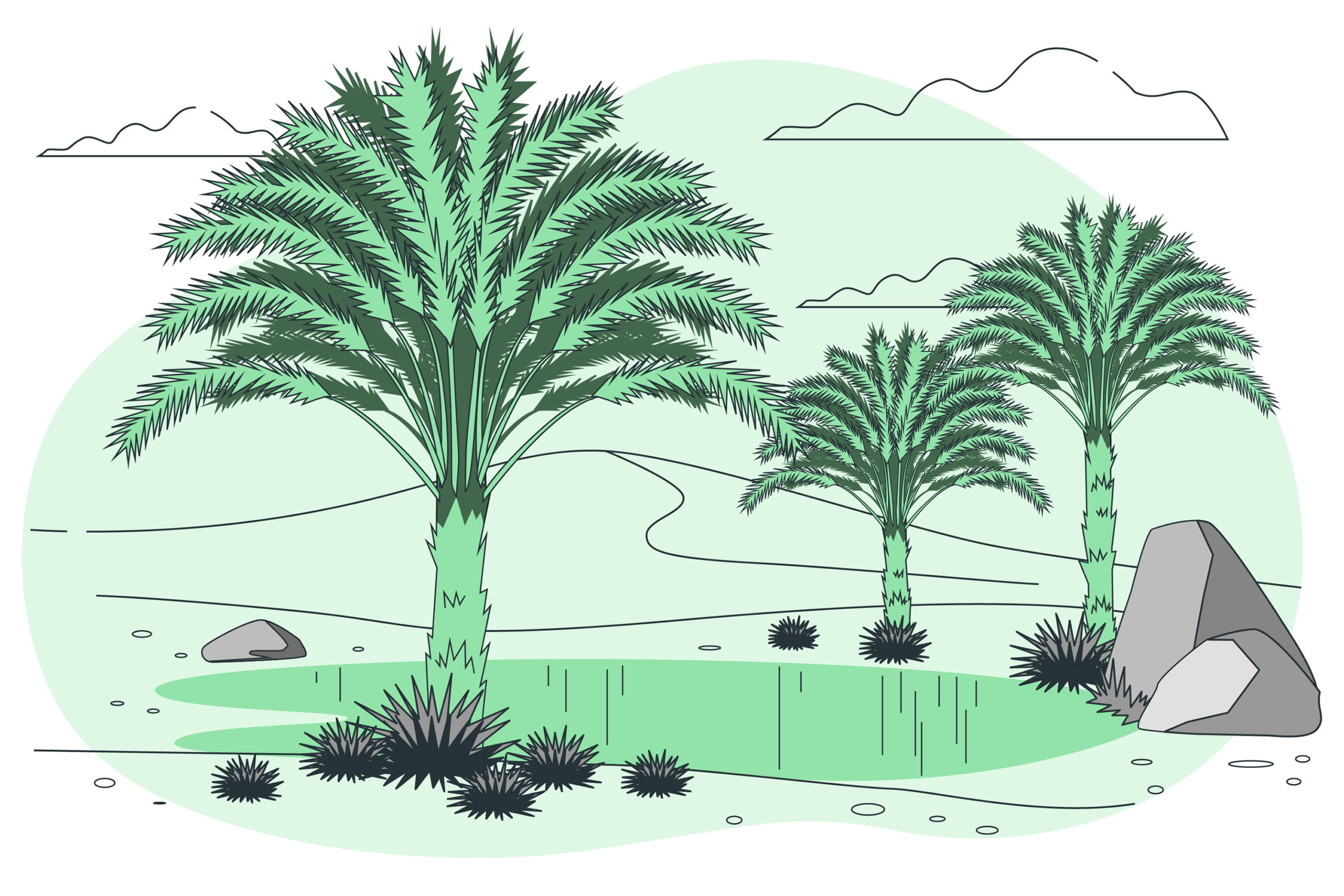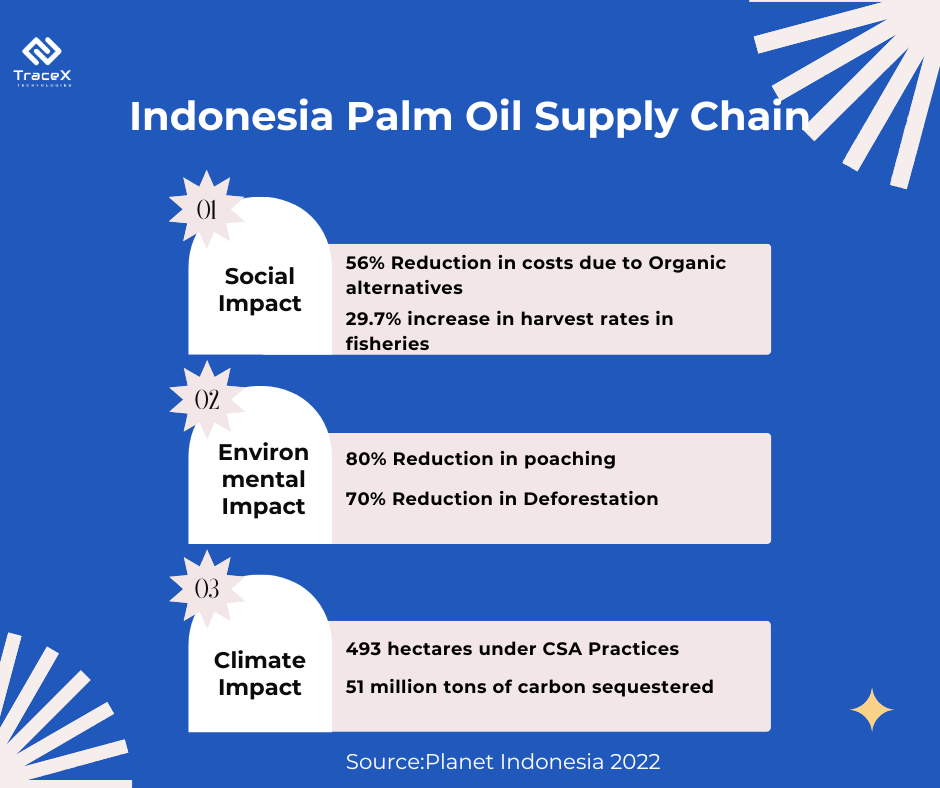Contact: +91 99725 24322 |
Menu
Menu
Quick summary: Uncover the journey towards transparency in Indonesia's palm oil supply chain. Explore the initiatives, technologies, and sustainability standards shaping the industry's future. Delve into the pivotal role of transparency in fostering ethical practices and global competitiveness.

Indonesia Palm Oil Supply Chain encounters extensive scrutiny, predominantly from Europe, regarding the environmental and social repercussions associated with its palm oil sector. Criticisms include issues such as deforestation, destruction of peatlands and fires, recurring episodes of thick smoke enveloping distant cities, land acquisition concerns, imbalances in profit distribution between major corporations and local farmers, climate emissions, and various other challenges.
Indonesia plays a pivotal role in the global palm oil industry, being one of the largest producers and exporters of this versatile commodity. Its lush tropical landscapes host extensive palm oil plantations, contributing significantly to the nation’s economy. However, this prominence also raises concerns about environmental sustainability, deforestation, and social impacts.
According to Trase Data, Indonesia is the world’s biggest producer of palm oil, exporting close to 28 million tons of crude and refined palm oil.
This blog delves into the importance of transparency in Indonesia’s palm oil supply chains, exploring the challenges and solutions vital for fostering sustainable practices and responsible sourcing in this critical industry.
Indonesia is the world’s largest producer of palm oil – a staple agricultural commodity found in about half of all packaged products sold in supermarkets. Spanning nearly 14.9 million hectares, palm oil plantations cover extensive regions throughout the country, solidifying Indonesia’s status as the global leader in palm oil production. With an annual estimated production surpassing 44.5 million metric tons of crude palm oil, Indonesia maintains its unparalleled position as the largest producer in the world.
The palm oil industry stands as a pivotal force in propelling Indonesia’s economy, contributing approximately 11% to the nation’s total exports in 2020.
Indonesia has emerged as one of the world’s leading producers of palm oil, with vast plantations spread across its diverse landscapes. The country’s tropical climate and favourable conditions make it an ideal environment for cultivating oil palm, driving its prominence in the global market. The palm oil industry holds paramount economic importance for Indonesia. It serves as a major contributor to the country’s export revenue, employment generation, and overall economic growth. The industry plays a crucial role in supporting livelihoods, particularly in rural areas where many depend on palm oil-related activities.
The country produces more than 30 million tons of palm oil per year, generating 4.5% of its GDP and giving employment to 3 million people.
Palm oil a common ingredient in various supermarket products such as ready meals, baked goods, chocolate, cosmetics, and shampoo, is also utilized in animal feed and as a growing source of biofuel. Studies indicate a strong correlation between palm oil prices and the expansion of industrial plantations, leading to forest loss.
However, the palm oil sector in Indonesia confronts an array of challenges. Issues such as deforestation, peatland degradation, environmental sustainability concerns, and social implications have sparked debates and controversies surrounding the industry. Striking a balance between economic development, environmental conservation, and social responsibility poses a considerable challenge that demands a nuanced exploration.
Indonesia’s palm oil industry has been a subject of significant controversy due to its considerable negative environmental and social consequences. Palm oil production has led to extensive deforestation of the country’s peat swamp forests, crucial habitats for endangered species like orangutans and vital ecosystems globally. This transformation to palm oil plantations often triggers forest fires, emitting substantial greenhouse gases from carbon-rich peatlands and exacerbating climate change. Socially, conflicts over land with local and indigenous communities persist, along with concerns about the exploitation of workers, including children.
The widespread demand for palm oil has exacted a considerable toll on the environment. Irresponsible production methods have triggered deforestation, the depletion of biodiversity, and the release of greenhouse gases, exacerbating the urgent challenge of global warming.
Deforestation– The growth of palm oil plantations frequently entails the clearance of tropical rainforests, leading to the devastation of crucial ecosystems and the displacement of indigenous communities. This deforestation releases substantial amounts of stored carbon dioxide into the atmosphere, hastening the pace of global warming.
Greenhouse Gas Emissions– The production of palm oil, especially through slash-and-burn practices, releases considerable quantities of methane and carbon dioxide into the atmosphere. These greenhouse gases trap heat, contributing to the global temperature rise.
Biodiversity Loss– The richness of plant and animal species found in rainforests faces a threat due to deforestation for palm oil production. The destruction of habitats leads to species extinction and disrupts the delicate ecological balance.

The need for transparency is paramount in addressing these deforestation issues. This involves disclosing information and practices within the palm oil supply chain to ensure responsible and sustainable practices are adopted. Transparency plays a crucial role in holding stakeholders accountable, fostering conservation efforts, and mitigating the negative effects of deforestation associated with palm oil production.
Encouragingly, a movement toward sustainable palm oil production is gaining momentum. This approach seeks to mitigate the adverse environmental and social effects of the industry while maintaining its economic viability. Key tenets of sustainable palm oil production involve preventing deforestation, protecting critical environmental areas, respecting local communities, enhancing efficiency, and ensuring transparency and traceability across the supply chain.
Unlock the power of traceability in commodity management!
Discover how TraceX’s cutting-edge technology ensures transparency, accountability, and efficiency throughout the commodity supply chain.
Explore our blog
Embracing sustainable practices in the palm oil industry is pivotal for climate change mitigation.
To mitigate the risk of ongoing global deforestation, the Roundtable on Sustainable Palm Oil (RSPO) emphasizes the necessity of collaboration across agricultural-commodity industries, supply chains, and with governments and NGOs. Transparent and verifiable supply chains are crucial for the credibility of sustainable production, and RSPO is dedicated to establishing, implementing, verifying, ensuring, and periodically reviewing credible global standards for the entire sustainable palm oil supply chain. While voluntary initiatives like RSPO are essential for due diligence, they are not a panacea. RSPO emphasizes the urgent need for government support to shift the balance towards deforestation-free supply chains, encompassing both legal and illegal aspects.
RSPO brings together over 5,000 stakeholders across 101 countries, spanning oil palm growers, processors, traders, consumer goods manufacturers, retailers, banks, investors, environmental and social NGOs, and civil society organizations. Serving as a platform for stakeholders to address palm oil sector challenges, RSPO has played a crucial role in reshaping palm oil production, trade, and sales. Approximately 19% of the global palm oil production is certified to RSPO standards, contributing to the protection of primary and secondary forests from legal and illegal deforestation, preserving wildlife habitats, and ensuring the well-being of workers, communities, and indigenous people in oil palm-producing regions.
The RSPO Principles & Criteria and RSPO Supply Chain Certification serve as effective tools for companies and governments to align with No Deforestation, No Peat, No Exploitation (NDPE) commitments in their palm oil sourcing policies. With seven core principles, including the imperative to “operate legally and respect rights,” RSPO Certification ensures legality in production, making it a valuable instrument for due diligence against illegal deforestation. Certification standards like RSPO provide a tangible opportunity for stakeholders to actively contribute to addressing challenges and encourage governments to incorporate these standards into their policies, promoting the purchase of RSPO Certified Sustainable Palm Oil in public procurement.
In recent years, digital tools and technological innovations have played a crucial role in promoting transparency within the palm oil supply chain. These advancements aim to address the longstanding challenges associated with the industry, such as deforestation, environmental degradation, and social issues.
Geospatial Technology– Utilizing satellite imagery and geospatial data, companies can monitor land-use changes in palm oil-producing regions. This technology enables the identification of deforestation and land clearing, helping stakeholders take proactive measures.
Blockchain Technology– Implementing blockchain in the palm oil supply chain enhances traceability. Each transaction and movement of palm oil can be recorded in an immutable and transparent ledger, providing an auditable trail from plantation to end product. This ensures accountability and reduces the risk of fraudulent practices.
Remote Sensing and Drones– Remote sensing tools and drones offer real-time data collection capabilities. These technologies can be deployed to survey plantations, assess land conditions, and detect any unauthorized activities. Drones, equipped with cameras and sensors, provide a detailed view of plantations, aiding in monitoring and compliance efforts.
Mobile Applications– Mobile apps empower local communities, farmers, and workers to report on-the-ground observations. These apps can facilitate communication, enabling real-time reporting of issues like labor violations, land disputes, or environmental concerns. This fosters transparency and encourages accountability.
Supply Chain Management Platforms– Integrated supply chain management platforms provide end-to-end visibility. These platforms enable companies to track the movement of palm oil across different stages, from cultivation to processing and distribution. This transparency supports responsible sourcing practices.
IoT– IoT devices can be deployed in plantations to collect data on environmental conditions, soil health, and plantation activities. Connected sensors and devices offer real-time insights, allowing for more efficient and sustainable agricultural practices.
Certification and Verification Tools– Digital certification and verification tools, integrated with blockchain or other secure technologies, enhance the credibility of sustainability certifications. These tools enable consumers and businesses to verify the authenticity of sustainable and responsibly sourced palm oil products.
By leveraging these technology solutions, the palm oil industry can transform its practices, promote transparency, and address environmental and social concerns associated with palm oil production. These innovations contribute to building a more sustainable and responsible supply chain for this crucial commodity.
TraceX’s blockchain traceability solutions play a pivotal role in revolutionizing the palm oil industry by enhancing transparency and sustainability. By integrating blockchain technology into the supply chain, TraceX ensures an immutable and transparent ledger, providing an unbroken chain of custody from palm oil cultivation to the final product. This robust traceability helps in precisely identifying the origin of palm oil, ensuring that it comes from sustainable and responsible sources. Through real-time tracking, stakeholders can monitor each step, preventing deforestation, land degradation, and unethical practices. TraceX empowers consumers, businesses, and regulatory bodies to verify the authenticity of sustainability claims, fostering trust and accountability in the palm oil supply chain. With TraceX, the palm oil industry can embrace a future where digital traceability contributes to environmental conservation and ethical practices, aligning with global sustainability goals.
In conclusion, achieving transparency in Indonesia’s palm oil supply chain is a critical step toward addressing environmental concerns, promoting sustainable practices, and meeting the demands of an increasingly conscious global market. By fostering collaboration among stakeholders, implementing robust traceability technologies, and adhering to stringent sustainability standards, the palm oil industry in Indonesia can pave the way for a more ethical and environmentally responsible future. Embracing transparency not only benefits the environment and local communities but also enhances the reputation of Indonesian palm oil on the international stage, ensuring long-term viability for this crucial economic sector.
